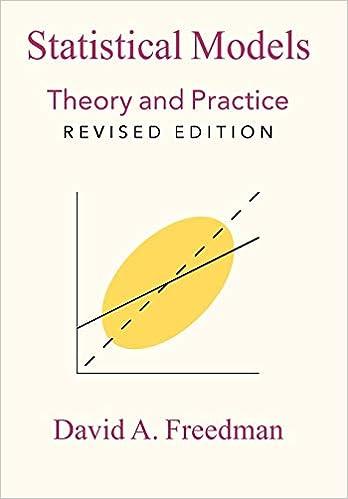(Partly hypothetical.) Psychologists think that older people are happier, as are married people; moreover, happiness increases with...
Question:
(Partly hypothetical.) Psychologists think that older people are happier, as are married people; moreover, happiness increases with income. To test the theory, a psychologist collects data on a sample of 1500 people, and fits a regression model:
Happinessi = a + bUi + cVi + dWi + $i, with the usual assumptions on the error term. Happiness is measured by self-report, on a scale from 0 to 100. The average is about 50, with an SD of 15. The dummy Ui = 1 if subject i is over 35 years of age, else Ui = 0. Similarly, Vi = 1 if subject i is married, else Vi = 0. Finally, Wi is the natural logarithm of subject i’s income. (Income is truncated below at $1.) Suppose for parts (b–d) that the model is right.
(a) What are the usual assumptions?
(b) Interpret the coefficients
b, c,
d. What sign should they have?
(c) Suppose that, in the sample, virtually all subjects over the age of 35 are married; however, for subjects under the age of 35, about half are married and half are unmarried. Does that complicate the interpretation? Explain why or why not.
(d) Suppose that, in the sample, virtually all subjects over the age of 35 are married; further, virtually all subjects under the age of 35 are unmarried. Does that complicate the interpretation? Explain why or why not.
(e) According to the New York Times, “The [psychologists’] theory was built on the strength of rigorous statistical and mathematical modeling calculations on computers running complex algorithms.”
What does this mean? Does it argue for or against the theory?
Discuss briefly.
Step by Step Answer:






